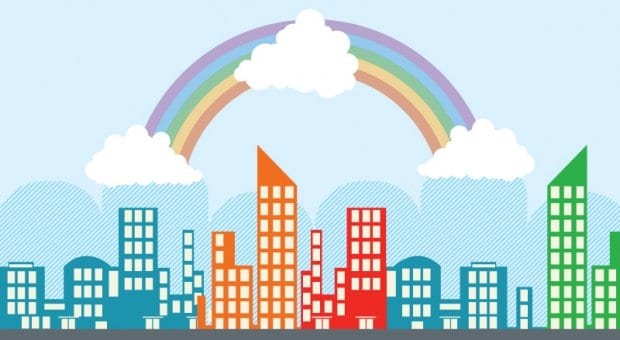Toronto is the economic and cultural hub of Canada and was recently crowned the fourth largest city in North America, but does it have the pull to become the continent’s next great travel destination? And can the city’s vibrant gay community be on the leading edge of a tourism renaissance?
With the imminent arrival of next year’s WorldPride celebrations, there’s no better time to ask than now. Toronto has been posting annual tourism growth for much of the last decade, with overnight visits now reaching 9.8 million annually. The hotel occupancy rate is 10th in North America, even as new high-end and boutique hotels, such as the Ritz-Carlton, Trump, Four Seasons and Shangri-La, continue to open in the downtown core.
Tourism Toronto, the agency responsible for marketing the city around the world, has been aggressively courting the gay market since 2007, when it snagged its president and CEO David Whitaker from Miami. The organization hosts pages on its website, seetorontonow.com, dedicated specifically to LGBT travellers and aggressively promotes to gay communities in its target cities.
It’s a strategy worth pursuing, according to data published in an Out Now travel market survey. Out Now predicts that the global travel market is worth $181 billion (US) in 2013, up from $70 billion in 2007. The same survey ranks Canada just 13th in volume of gay tourists, with an annual market value of $6 billion (US). That puts Canada behind Poland in the number of gay visitors it receives and just behind Spain’s dollar share of the market.
And Toronto is failing in some important ways. Tourism Toronto’s LGBT travel-information section has a nightlife page that encourages travellers to check out Zelda’s, CiRCA, Slack Alice and Fuzion, all bars that have been closed for some time. But it neglects to mention the burgeoning queer scene in Kensington, Ossington, West Queen West and Parkdale. Meanwhile, despite nightlife being a chief attraction for visitors, city council has been working hard to limit the growth of the bar, club and restaurant industry in Toronto, with zoning exclusions and development moratoriums passed or proposed in nearly all of Toronto’s hippest neighbourhoods.
Tourism Toronto is putting resources behind promoting next year’s WorldPride festivities on its website and around the world as well. But how much that will pay off remains an open question. WorldPride has virtually no track record as a successful international event — each of its three previous iterations were marred by controversy and cancellations.
Former Pride Toronto executive director Tracey Sandilands told City News after winning the WorldPride 2014 bid that she expected the event to bring in “five times” Pride’s usual one million visitors. But even that number is misleading — when Pride organizers claim that one million people attend, they’re counting visits to various Pride events throughout Pride week, not unique visitors from outside Toronto. Pride’s own 2009 economic-impact study concludes that of 411,000 people who attended Pride, 303,000 were from the Toronto area.
While new executive director Kevin Beaulieu is lowering expectations for the event, even his more conservative projections would be an enormous boost to Toronto tourism. “Because it’s the first North American and fourth WorldPride ever, the travel patterns aren’t established. We’re expecting hundreds of thousands more visitors, up to two million visits to Pride,” says Beaulieu, reached at Vancouver Pride, where he’s promoting next year’s party.
Pride Toronto will spend this year working toward ensuring that gay travellers around the world are aware of WorldPride. It’s had representatives on the ground at major Pride festivities across North America, as well as São Paolo Pride and EuroPride, sent promotional materials to the smaller Prides, purchased ads in gay media, and is recruiting its volunteers and community members to reach out to their friends in other cities to invite them to the party. And its work is being supplemented by promotional work being done by Tourism Toronto and the Ontario Tourism Marketing Partnership at their regional offices around the world.
To help promote the city as a whole and boost the profile of WorldPride as an event, Pride is also working with the city’s major cultural institutions to offer queer programming during the festival, and the city is working with neighbourhood associations to improve the Village, with its new parklets and the soon-to-launch mural project.
“The quality of the event is the first metric of success,” Beaulieu says of expectations for WorldPride. “That means that people who arrived here understood that it was a special event … and the engagement of the community, whether Torontonians feel proud to have hosted it.”


 Why you can trust Xtra
Why you can trust Xtra